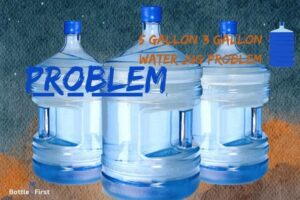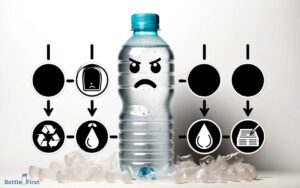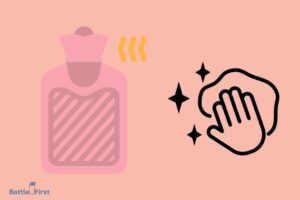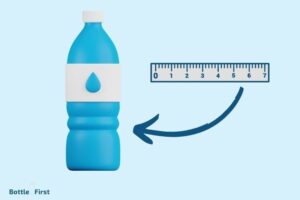Why Does My Water Bottle Smell? Bacteria!
Your water bottle smells because it’s a perfect breeding ground for bacteria and mold.
This happens when it’s not regularly cleaned, when you leave it with water for a long time or when you use it for drinks other than water, such as juice or smoothies.
Bacteria and mold thrive in moist, warm environments, which is exactly what your water bottle provides, especially if it’s often closed.
These microorganisms can multiply rapidly and produce a foul smell. The smell can also be caused by remnants of drinks, such as juice or smoothies, that ferment over time.
To eliminate this unpleasant smell, clean your water bottle regularly with hot soapy water.
Consider using a bottle brush to scrub the inside, especially if it has a narrow mouth. Also, try to air dry it completely before closing the lid.
For stubborn smells, a vinegar rinse or baking soda scrub can prove to be very effective.
5 Reasons: Why Your Water Bottle May Smell
| Reason for Smell | Explanation |
|---|---|
| Bacterial Growth | If your water bottle isn’t cleaned on a regular basis, bacteria can grow and create a bad smell. |
| Type of Water | The type of water you are drinking can alter the smell of your water bottle. Some tap water contains certain minerals and chemicals that can leave a residual smell. |
| Materials of the Bottle | Certain materials, like some plastics, can hold onto smells more than others. Even after cleaning, they can still retain the smell. |
| Leftover Residue | Leaving flavored drinks or food residue in your water bottle can cause it to smell. |
| Improper Drying | If the water bottle is sealed while still wet, it can create a damp environment that encourages the growth of mildew and mold, which can cause a smell. |
Key Takeaway
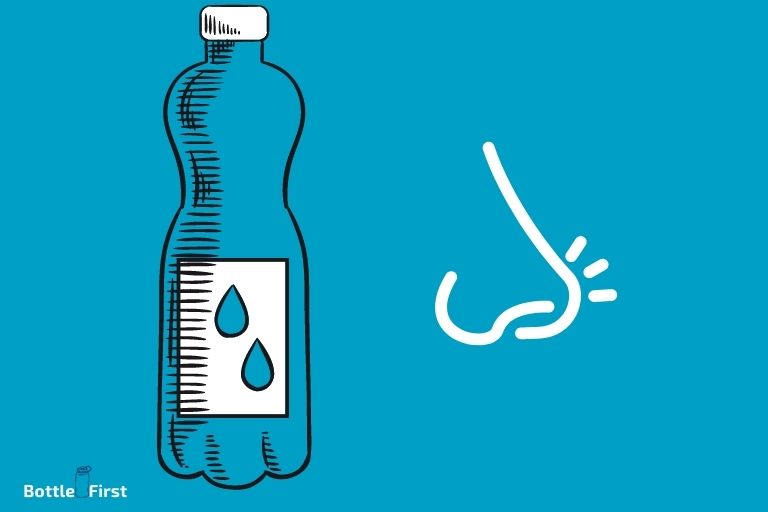
Five Facts About: Smelly Water Bottles
The Science Behind Odor In Water Bottles
Bacterial Growth And Odor Formation:
Chemical Reactions Causing Unpleasant Smells:
Common Culprits Of Odor In Water Bottles
Residue From Beverages And Food
Residue from beverages and food can accumulate in your water bottle over time, leading to an unpleasant smell.
Here are some key points to note:
Lack Of Proper Cleaning And Maintenance
Inadequate cleaning and maintenance of your water bottle can also result in that less-than-fresh smell.
Consider the following points:
Tips For Preventing Odor In Water Bottles
In this section, we will explore some effective tips for keeping your water bottle fresh and odor-free.
Regularly Clean And Disinfect Your Water Bottle
Cleaning your water bottle regularly is essential for preventing odor buildup.
Here’s how you can do it:
- Rinse the bottle with warm water after each use to remove any remaining traces of liquid.
- Use a mild dish soap and a bottle brush to scrub the interior of the bottle.
- Pay extra attention to hard-to-reach areas, such as the cap and mouthpiece.
- Rinse the bottle thoroughly to ensure no soap residue is left behind.
- Allow the bottle to air dry completely before using or storing it.
Disinfecting your water bottle should be done on a regular basis:
- Fill the bottle with a mixture of equal parts water and white vinegar.
- Let the solution sit for a few hours or overnight to eliminate any bacteria or odor.
- Rinse the bottle thoroughly with warm water to remove the vinegar smell.
- Again, allow the bottle to air dry fully before using it.
Avoid Storing Beverages Other Than Water For Prolonged Periods
One common reason why water bottles develop an unpleasant smell is due to storing beverages other than water for extended periods.
Here are some tips to avoid this issue:
- Use separate water bottles dedicated to specific beverages, such as coffee, tea, or sports drinks.
- If you do use your water bottle for beverages other than water, wash it immediately after use.
- Avoid leaving any liquid in the bottle for more than a day, especially if it contains sugars or fats that can promote bacterial growth and odor.
- Opt for a water bottle with a wide mouth opening, as it will be easier to clean and prevent lingering smells.
Use Specialized Cleaning Tools And Products
Investing in specialized cleaning tools and products can make a significant difference in preventing odor in water bottles.
Consider the following options:
- Bottle brushes with long handles and flexible bristles can effectively reach all areas of your bottle, ensuring a thorough clean.
- If your water bottle has a straw or mouthpiece, look for small brushes designed specifically for cleaning those parts.
- Alternatively, you can use cleaning tablets or specialized bottle cleaners that eliminate bacteria and odor.
By implementing these tips, you can keep your water bottle smelling fresh and clean.
Remember to regularly clean and disinfect your bottle, avoid storing non-water beverages for extended periods, and utilize specialized cleaning tools and products.
Enjoy your refreshing drinks without any unpleasant surprises!
Effective Cleaning Methods For Odor Removal
Do you ever notice a strange smell coming from your water bottle even after washing it? It can be quite frustrating and off-putting.
But fear not, there are effective cleaning methods that can help eliminate those unpleasant odors.
In this section, we will explore three tried-and-tested cleaning techniques using common household ingredients: vinegar and water solution, baking soda paste, and lemon juice and warm water mixture.
Vinegar And Water Solution
- Prepare a mixture of equal parts vinegar and water.
- Remove the cap and any attachments from your water bottle.
- Fill the bottle halfway with the vinegar and water solution.
- Shake the bottle vigorously for a few seconds to ensure the mixture reaches all areas.
- Let the solution sit in the bottle for at least 15 minutes, or longer for stubborn odors.
- Rinse the bottle thoroughly with warm water.
- Leave the bottle to air dry completely before using it again.
Baking Soda Paste
- Create a paste by mixing baking soda with a small amount of water until it forms a thick consistency.
- Apply the paste to the inside of the bottle, including the cap and any attachments.
- Scrub the bottle’s interior with a brush or sponge, focusing on areas with odor buildup.
- Let the baking soda paste sit in the bottle for 30 minutes to an hour.
- Rinse the bottle thoroughly with warm water, ensuring all the paste is washed away.
- Allow the bottle to air dry completely before using it.
Lemon Juice And Warm Water Mixture
- Squeeze the juice of one lemon into a bowl.
- Mix the lemon juice with warm water, using a ratio of one part lemon juice to three parts water.
- Pour the mixture into the bottle, filling it halfway.
- Allow the lemon water solution to sit in the bottle for 30 minutes.
- Rinse the bottle thoroughly with warm water.
- Leave the bottle to air dry completely before using it again.
By utilizing these effective cleaning methods, you can say goodbye to the unpleasant smell in your water bottle.
Remember to clean your bottle regularly to maintain freshness and ensure a hygienic drinking experience.
Choosing The Right Water Bottle To Minimize Odor
Have you ever noticed a strange odor coming from your water bottle? Don’t worry, you’re not alone.
The buildup of odor in water bottles is a common issue that many people face.
However, the good news is that there are ways to choose the right water bottle that can help minimize this unpleasant smell.
In this section, we will explore some key factors to consider when selecting a water bottle that resists odor absorption and is easy to clean.
Materials That Resist Odor Absorption
Choosing a water bottle made from the right materials can greatly reduce the chances of odor buildup.
Here are some materials that resist odor absorption:
- Stainless steel: Stainless steel water bottles are known for their durability and ability to resist odors. The non-porous surface of stainless steel prevents the absorption of odors, ensuring your water tastes fresh every time.
- Glass: Glass water bottles are another great option as they do not retain odors or flavors. Additionally, glass is easy to clean and does not contain any harmful chemicals that may leach into your water.
- Bpa-free plastic: If you prefer a lightweight and unbreakable option, look for bpa-free plastic bottles. These bottles are specifically designed to minimize odor absorption and are safe for everyday use.
Easy-To-Clean Designs And Features
Keeping your water bottle clean is essential for preventing odor buildup.
Look for bottles with easy-to-clean designs and features, such as:
- Wide mouth opening: A water bottle with a wide mouth opening allows for easy access, making it easier to clean thoroughly.
- Removable parts: Bottles with removable parts, such as lids and straws, are easier to clean since you can reach all the nooks and crannies.
- Dishwasher-safe: Check if the water bottle is dishwasher-safe. This feature can save you time and ensure a thorough cleaning.
In Summary
By choosing a water bottle made from odor-resistant materials such as stainless steel, glass, or bpa-free plastic, you can minimize odor absorption.
Furthermore, opting for designs with easy-to-clean features like wide mouth openings, removable parts, and dishwasher-safe options will help ensure your water bottle stays fresh and odor-free.
Make the right choice and enjoy refreshing, odorless hydration wherever you go.
FAQ About On Why Does My Water Bottle Smell?
Why Does My Water Bottle Smell?
The smell in your water bottle is caused by bacterial growth from trapped moisture and food particles.
What Are The Common Causes Of A Smelly Water Bottle?
Dirty water bottles, improper cleaning, and leaving water in the bottle for too long can cause the unpleasant smell.
How Can I Get Rid Of The Smell In My Water Bottle?
To remove the smell, thoroughly clean your water bottle with warm soapy water and a bottle brush, then rinse it well.
How Often Should I Clean My Water Bottle To Prevent Odor?
To prevent odor, clean your water bottle daily by washing it with soap and water, and let it air dry completely.
Can I Use Any Cleaning Products To Remove The Smell?
Avoid using harsh chemicals or bleach. Instead, use a mixture of baking soda and water or white vinegar to neutralize the odor.
Conclusion
To sum up, addressing the smell in your water bottle is essential for your overall health and well-being.
By understanding the potential causes, such as bacteria build-up, improper cleaning, or the quality of the materials used in your bottle, you can take the necessary steps to eliminate the unpleasant odor.
Start by regularly cleaning your bottle with mild soap and water, ensuring thorough rinsing. Consider using natural cleaning agents like vinegar or baking soda for deeper cleansing.
Pay attention to any cracks or damage in your bottle, as these can provide breeding grounds for bacteria.
Lastly, investing in a high-quality, bpa-free water bottle can help prevent odors from occurring in the first place.
By taking these simple yet effective measures, you can enjoy fresh, odor-free water on the go, contributing to your overall hydration and health.

